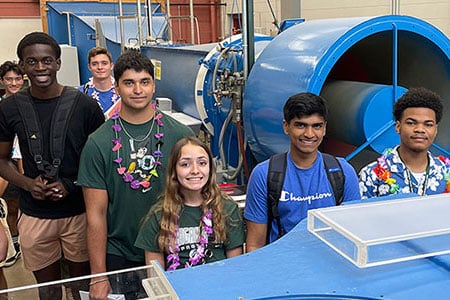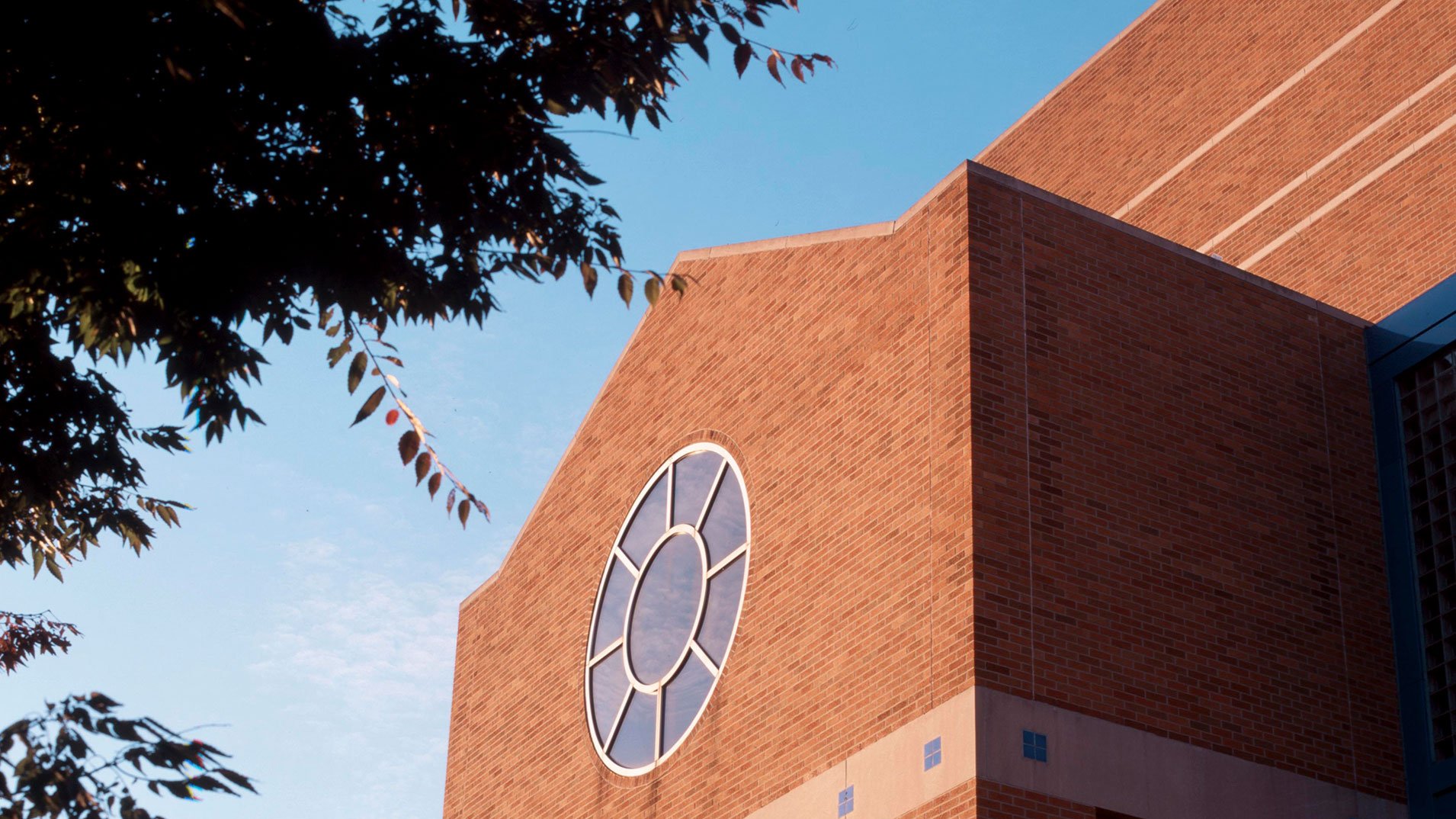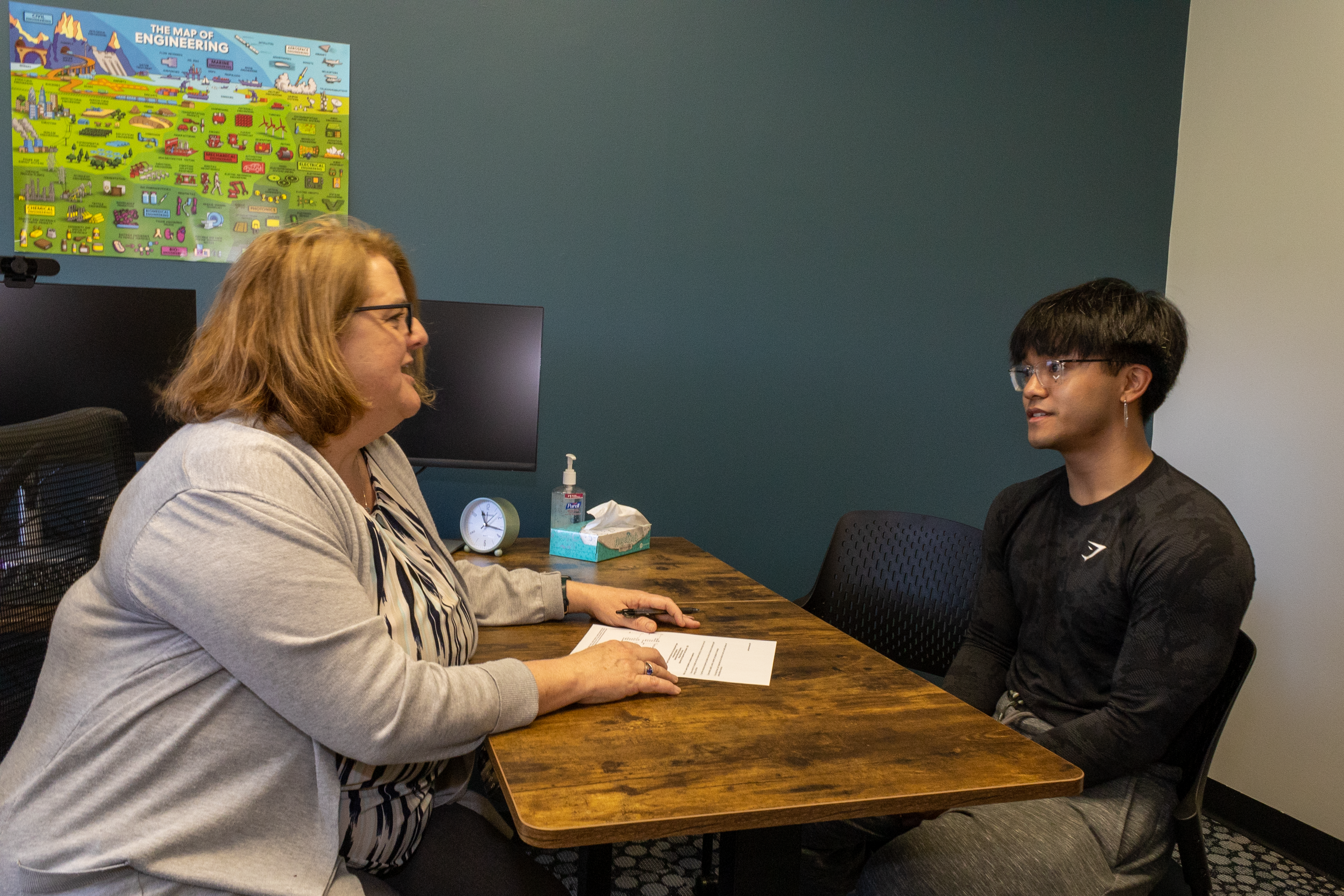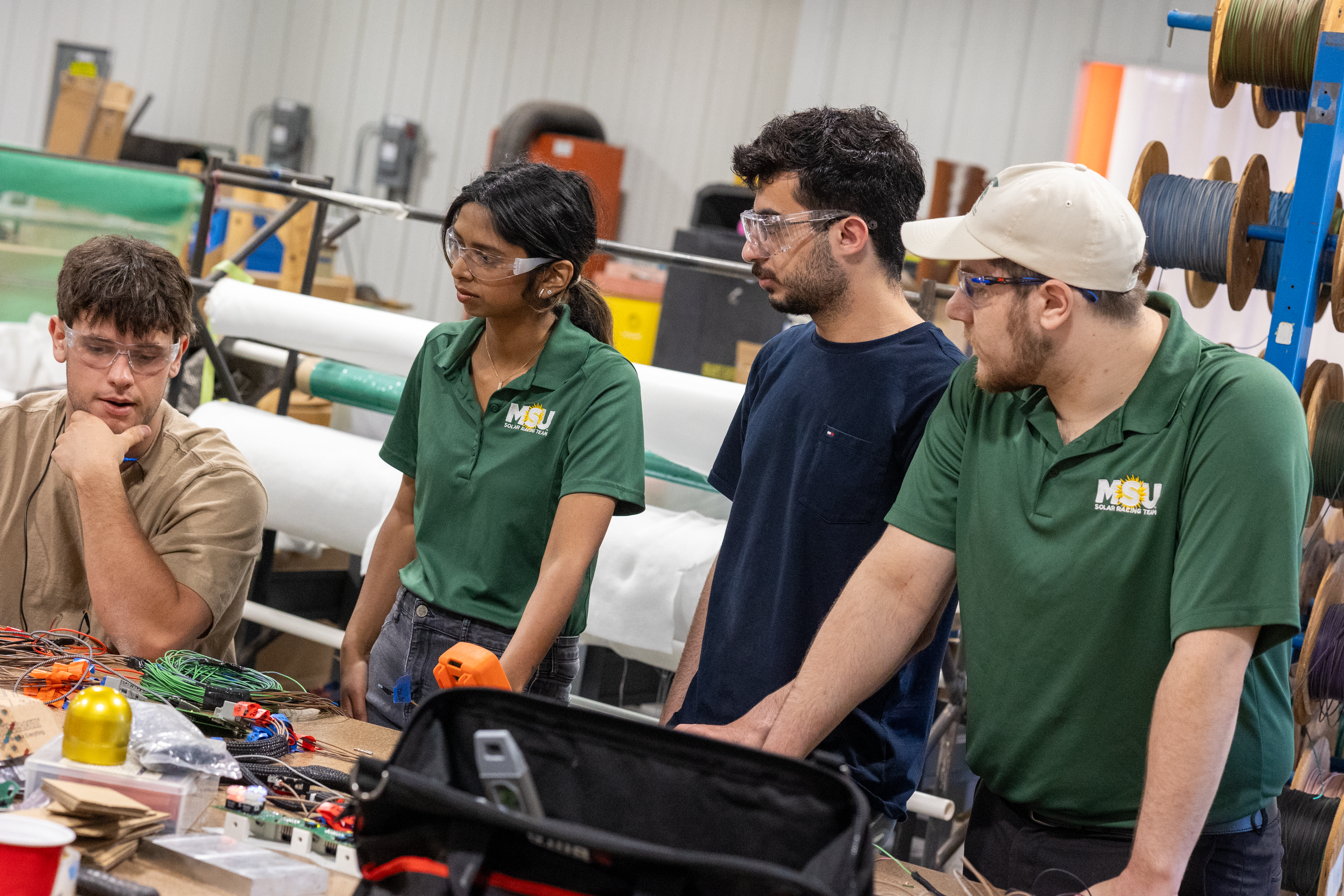The Center for Spartan Engineering
Explore careers and co-ops, get career help, and connect with employers
Computer Science and Engineering (CSE) as a Minor
The academic minor in Computer Science will provide a basic foundation in Computer Science. Those completing the minor will be able to apply computing skills in their respective discipline. The minor in Computer Science is available as an elective for those students enrolled in a bachelor's degree program at MSU other than the Bachelor of Science Degree in Computer Science or the Bachelor of Science Degree in Computer Engineering or the Bachelor of Science Degree in Computational Data Science, or the Bachelor of Science Degree in Data Science. The official requirements for the Computer Science Minor can be viewed in the MSU Academic Programs Catalog.
Students wanting to complete the minor must apply to the Department of Computer Science at the time of completion of CSE 231 and CSE 260 with an average of at least 3.0 for those two courses combined. Enrollment may be limited. Permission is required to take more than 18 CSE credits.
Calculus I and Calculus II are implied components of the Computer Science Minor, since those courses are prerequisites for required courses in the Minor.
When to Apply
The student should complete this application between the 10th week and 14th week of the semester in which the acceptance criteria given below will be met. Students must list their grades in both CSE 231 and CSE 260 on the application. If one of these courses is being completed during the current semester, students should submit the application on the day the grade is posted. The CSE Department will make the acceptance decision by the end of the first week of the following semester. Acceptance may be limited by available resources.
Application to the CSE Minor
Forms
Course Permission requests will be handled on a first-come-first-served basis, with priority given to students who are required to take the course in order to graduate in a timely manner.
- You should only request a course permission (override) if you will have completed the prerequisites before taking the class. CSE does not allow students to request permission to take a course if the prerequisite requirements have not been met under any circumstances.
- If you have met the prerequisite for a course in another way (e.g., you are transferring in the prerequisite from another institution, you took an MSU course that is equivalent to the prerequisite), you must indicate that information in the request form.
- You should only request permission if a course is not yet full to the room capacity.
- The CSE Department will do its best to accommodate every request, but limited resources may prevent us from granting special permission to take a course. If denied, you should talk to your academic adviser about alternative course options.
- CSE requests are reviewed biweekly. It may take up to three weeks for you to receive a response regarding your request.
If you have major concerns, please email one of the following parties with the subject “Course Permission Request for CSE xxx”:- CSE 200-to-400-level courses (except 498) - Email cseadvising@egr.msu.edu and an undergraduate adviser can help you.
- CSE 498 – Billy Massey - masseybi@msu.edu
- CSE 102 – Dr. Charles Owen – cbowen@cse.msu.edu
Course Permission Request Deadlines
Enrollment Limit Requests (if you are requesting space in a course)
- Fall Semester CSE courses - Submit requests before the end of May
- Spring Semester CSE courses - Submit requests before the end of the Fall Semester
- Summer Semester CSE courses - Submit requests before the end of the Spring Semester
Prerequisite Requests (if you are expecting to meet course prerequisites in another way, and you want to be able to enroll in a CSE course on your April enrollment date)
- CSE courses for the next Academic Year
- Submit requests before the third week of March
CSE Undergraduate Course Permissions (Override) Information and Request Form
Education Abroad
The College of Engineering offers a broad selection of education abroad programs specifically designed for selected majors in order to assure academic success. Once you are admitted to the university, connect with your engineering adviser to talk through your academic plan and education abroad options.
FAQ
It is a requirement that all undergraduate students at Michigan State University have a laptop computer that can be connected to the internet. Beyond that, this page has some recommendations for computing that will serve Computer Science and Computational Data Science students well.
Basic Requirements
- A computer with sufficient power to run engineering software or to access that software through a remote portal provided by the College
- Only Windows and Macintosh laptops are recommended. Chromebooks are specifically not recommended.
- See below for specific recommendations.
- An internet-ready camera (e.g. webcam or smartphone) with video capability. Integrated webcams in laptops are just fine.
- A way to scan handwritten exam or quiz responses for electronic submission
- A cellphone camera with Adobe Scan or Cam Scan (both free software) works well
- Speakers/headphones and microphone for video conferencing (either through a computer, tablet, or smartphone)
- If you are planning to use public resources (college labs, coffee shops, etc.), you should obtain a USB-based headset with a built-in microphone. Many lab computers do not have speakers, cameras or microphones. Even if you are using a computer with speakers, you will want a headset to minimize disrupting others in a public setting.
- An internet connection with a download speed of at least 1 Mbps (check your speed at speedtest.net – free website or app works with desktops, tablets, and smartphones)
- Traditional internet connection
- Cellular connection with an appropriate data plan and good coverage (depending on your phone and service provider, you can use your phone to connect your computer to the internet)
- Campus services will always provide sufficient bandwidth.
A good general recommendation for a suitable laptop system for Computer Science and Computational Data Science would be a late -model Windows or Mac system, as they will provide the most flexibility. A Chromebook or tablet will likely not support many of the needs you will have. Linux-based systems can be used, but consider that an advanced skill.
Minimum Recommended Configuration
- i5 minimum (i7 better) processor or Apple Silicon (M1)
- 16GB computer memory/RAM (no lower than 8GB in any case)
- Device ports -- the more the better, and USB 3.0 or USB-C/Thunderbolt specification
- Computer storage: SSD disk drive, 256GB minimum. SSD is not mandatory, but it makes a massive difference in performance (and weight).
- Graphics -- don't need high end graphics adapter unless you plan to do a lot of video editing or gaming. Consider an external output such as HDMI mandatory. Your display should have a minimum resolution of 1920 x 1080 (1080p).
- Network connectivity -- support a/b/g/n and both 2.4GHz and 5GHz frequencies; an Ethernet port is nice to have, but wireless is mandatory. Also, computer should have Bluetooth capability.
- You may want to consider an external monitor to provide large screen viewing. (Many LCD TVs can double as a computer screen).
Macintosh laptops are completely acceptable, but may have a limited number of ports. Consider purchasing a USB-C or Thunderbolt hub with multiple USB ports and HDMI video.
One thing to avoid is looking for the "perfect" system. There is no single "best" system. You want to get an acceptable system for both today and the foreseeable future.
The Capstone Experience provides the educational capstone for all students majoring in computer science at Michigan State University. Teams of students build software projects for a variety of project sponsors. Visit the Capstone Experience website for more information.
Students interested in pursuing Honors options in CSE courses should contact the course instructor to inquire about the possibility of completing an Honors option for a specific CSE course. Additional information about Honors options is available on the Honors College website.
Honors Advising Information
For questions related to university requirements (e.g., SS/AH substitutions, HCAPP), Honor students should meet with their Honors adviser. For questions related to academic planning or college/major requirements, Honors students should meet with their major adviser.
For questions about undergraduate research, career planning, or graduate school, Honors students may start with their major adviser but might also wish to speak with a faculty member. College of Engineering and CSE faculty members available for honors advising are listed on the Honors College website.
CSE Departmental Prerequisite and Course Restriction Policy
All students are required to meet course prerequisites and major restriction requirements before taking any CSE course. This policy also applies to Honors students. If any student, including an Honors student, is enrolled in a CSE course without meeting the prerequisites, the CSE Department reserves the right to remove that student from the course. Students will always be notified before being removed from a CSE course. If you have questions about this departmental policy, please speak with your major adviser.
Visit the Scholarships and Financial Resources page for information.
The Department of Computer Science and Engineering (CSE) at Michigan State University is revolutionizing research in engineering, the natural sciences, and beyond. We are pursuing research that presses the boundaries of knowledge and gives birth to new fields.
Examples include humanities, medicine, natural science, criminal justice, supply chain management, and natural language research. Below are a few samples of our interdisciplinary research projects.
Biometrics
CSE’s Pattern Recognition and Image Processing Lab (PRIP) is a world leader in biometric recognition research and technology. Biometrics refers to the automatic recognition of individuals based on their physiological (e.g. face, fingerprint, or iris) and/or behavioral (e.g., signature) characteristics. Because of increased concerns about terrorist attacks, security breaches, and financial fraud, many systems now require reliable personal recognition schemes to confirm or deny the identity of an individual.
Computing for the Humanities
MATRIX Quilt Project
The creative partnership between computer science, the humanities, and the social sciences — the core of what we now call "humanities technology"— is the cornerstone of the digital revolution. MATRIX, The Center for Humane, Arts, Letters, and Social Sciences Online, serves as a catalyst for and incubator of the emerging fields and disciplines resulting from the integration of the humanities with information technologies.
Digital Evolution
Discover Feb 2005 Magazine Cover
Faculty in CSE and the life sciences have gained insights into previously unsolved questions of evolution using digital organisms. A population of self-replicating computer programs is subjected to external pressures (such as mutations and limited resources) and allowed to evolve subject to natural selection. This is not a mere simulation of evolution -- digital organisms evolve to survive in a complex computational environment and will adapt to perform entirely new traits in ways never expected by the researchers, some of which seem highly creative. This work, which has enabled the study of evolution to go in directions never thought possible, has been published in Nature, Science, and Discover magazine.
Genomics, Evolution, and Development
The Genomics, Evolution, and Development lab investigates the mechanisms of development: how embryos develop, how genomes encode the developmental process, and how the developmental process has evolved. The lab interests are diverse, yet there is a common goal: researchers seek to intermingle computation with experiment in order to improve our understanding of biology. The lab intersects with a number of fields, both new and old, including developmental biology, molecular biology, bioinformatics, regulatory genomics, and metagenomics.
High-Assurance Systems Initiative
High-assurance computing systems are designed to tolerate failures, and even direct attacks, in order to continue system operation and preserve system integrity. The project uses a real-world problem-driven, multidisciplinary approach to deliver instruction, conduct research, and develop reliable and secure cyber infrastructure. The initiative has received funding from numerous federal agencies (e.g. NSF, ONR, AFRL, DARPA).
Ultra-Large-Scale Software-Intensive Systems
CSE is forming a new NSF-sponsored Industry/University Collaborative Research Center. The project will bring together multidisciplinary researchers (from MSU, U of Virginia, Vanderbilt, and UC San Diego) and industrial collaborators to develop technologies for an emerging area known as Ultra-Large-Scale Software-Intensive Systems (ULSSIS, pronounced "Ulysses"). MSU's focus will be on automated software development for high-assurance and autonomic, run-time adaptive systems.
Research Opportunities
- Gale Onefile: Computer Science Index of journal articles in computer science
- Venture Database of research opportunities for undergraduates
- MSU Libraries Electronic Resources
It’s your time to find your passions and new areas of interest. Visit Undergraduate Research for more information on getting started.
Student Groups
Student groups provide opportunities to develop leadership and communication skills and to form lasting friendships.
The Computer Science and Engineering Graduate Student Association (CSEGA) promotes leadership, support, and social fellowship in the CSE graduate student community.
The student chapter of the Association for Computing Machinery (ACM) has long sponsored a wide variety of activities, such as video game contests and weekly faculty/student doughnut hours.
Spartasoft is devoted to learning about and taking part in video game development.
Visit the College of Engineering Student Groups page and the MSU Registered Student Groups page to learn about opportunities to engage.







